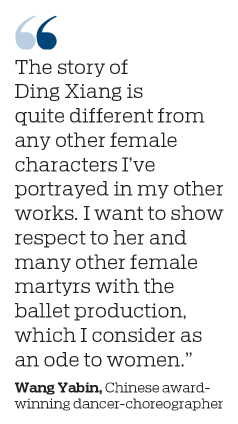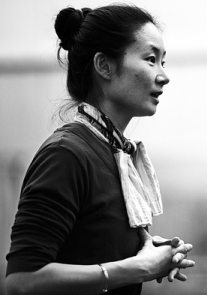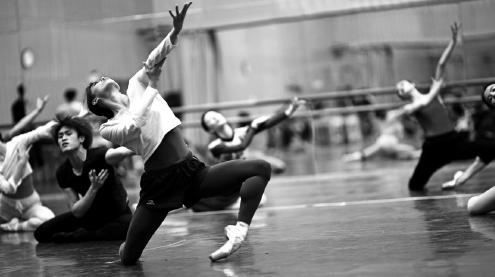Ballet will remember martyr's sacrifice

New production by Suzhou company highlighting inspirational bravery will mark Party centenary
The story of Ding Xiang, a martyr who died at the age of 22 during the War of Resistance against Japanese Aggression (1931-45), has been adapted into a ballet. The Suzhou Ballet Theatre will mark the 100th anniversary of the founding of Communist Party of China and pay tribute to the martyrs with the production, My Name is Ding Xiang. It will premier at the grand theater of Suzhou Culture and Arts Center in Suzhou, Jiangsu province, on June 11 and will run through June 13.
Ding, whose real name was Bai Dingxiang, was born in 1910 in Suzhou. She was abandoned by her parents and was adopted by a missionary in Suzhou. In 1930, she joined the Communist Party of China and two years later, she married her classmate, Le Yuhong, who was also a Party member. In 1932, five months after they got married, Ding was arrested during a trip to Beijing to perform a secret task. In December that year, she was killed at the age of 22. Her husband didn't remarry until 1952.
The 90-minute ballet is choreographed and directed by Chinese award-winning dancer-choreographer Wang Yabin. She is known for her choreographic pieces, including Moon Opera, that premiered at the National Centre for the Performing Arts in Beijing in 2015 and was adapted from a novel of the same title by Chinese author Bi Feiyu.
"I have choreographed dance works revolving around female characters," says Wang. "When the Suzhou Ballet Theatre approached in July 2020, I was intrigued by the story of Ding Xiang. She is a martyr and she also a woman." Wang was born and raised in Tianjin and was sent to dance classes as a young child by her mother.
Wang found dancing interesting and learned styles from different countries, and her talent was recognized at 9 when she was enrolled to study at the Beijing Dance Academy, where she received training in classical Chinese dance, ballet and contemporary dance.
She has won national dance competitions, including first prize at the seventh Taoli Cup National Dancing Competition in 2003, the year she graduated from Beijing Dance Academy and started teaching in the university. She is still a member of the Youth Dance Company of the Beijing Dance Academy. At 25 Wang rose to fame by performing as the dance double for actress Zhang Ziyi in Chinese film director Zhang Yimou's 2003 film, House of Flying Daggers. For the past decade, Wang has run a project, titled Yabin and Her Friends, bringing together Chinese and international choreographers to create a new dance piece every year.
To prepare for creating the new ballet, My Name is Ding Xiang, Wang, along with artists of Suzhou Ballet Theatre, traveled to Yuhuatai Scenic Area in Nanjing, which is known for several tourist attractions that preserve the stories of the martyrs, including Ding.
"I was touched by her story, which deserves to be known by today's young generation. When she died, she was three-months pregnant. Her husband missed her so much," says Wang, adding that the roles, including Ding Xiang, Le Yuhong, Le's second wife, Shi Zhongman, and Le's daughter Le Dingxiang, will be portrayed in the ballet production.
From reading the documents, Wang also learned that Ding loved to play piano while her husband loved to play erhu. The two musical instruments will be featured in the ballet production to mark their love.
"The story of Ding Xiang is quite different from any other female characters I've portrayed in my other works. I want to show respect to her and many other female martyrs with the ballet production, which I consider as an ode to women," Wang says.
According Li Ying, founder and artistic director of Suzhou Ballet Theatre, the new ballet production, like the past eight ballet productions the company has created since it was founded in 2007, will feature distinctive styles of Suzhou, such as the stage setting, music and costumes. For example, the exquisite design and beauty of Suzhou's gardens and architecture, will be featured.
She adds that the company has been exploring Chinese style ballet for years with its productions, such as Shakespeare's Romeo and Juliet, Legend of Beauty, which was based on the story of renowned Chinese beauty Xi Shi during the Spring and Autumn Period (770-476 BC), and Tang Yin, which centers on the story of the famous Chinese painter, calligrapher and poet of the Ming Dynasty (1368-1644).
"With the unique Suzhou style, we want to tell stories and deliver emotions in a very subtle and poetic way," says Li.
Born in Shanghai Li started dancing at the age of 11. A former ballerina, Li founded the Suzhou Ballet Theatre in 2007 along with her husband, Pan Jiabin, also a former ballet dancer, who is a native of Suzhou.
The couple met at the Beijing Dance Academy and married in 1991. Both of them had been principal dancers with the National Ballet of China from 1987 to 1992 and joined the US ballet company BalletMet in Columbus, Ohio, before dancing with the Pittsburgh Ballet Theater for 12 years until 2006.
Li once performed as Juliet in Romeo and Juliet, a ballet produced by the National Ballet of China in 1992 with her husband, Pan, as Romeo. Thus, Romeo and Juliet became the company's first original full-length ballet work, which premiered in 2010 and later toured both home and abroad.
"My goal of launching the Suzhou Ballet Theater was to create original Chinese ballet works, not just telling Chinese stories but also interpreting Western classics with a Chinese angle," Li says.
"Chinese ballet companies are devoted to creating original Chinese ballet works which tell Chinese stories. For example, the first generation of Chinese ballet artists created Red Detachment of Women, which premiered in 1964 by the National Ballet of China and has become a classic and is still performed home and abroad. There are many great stories, like Ding Xiang, which inspire today's artists," says Suzhou Ballet Theatre's president Wang Quanxing, the former deputy director of the National Ballet of China.
chennan@chinadaily.com.cn


























